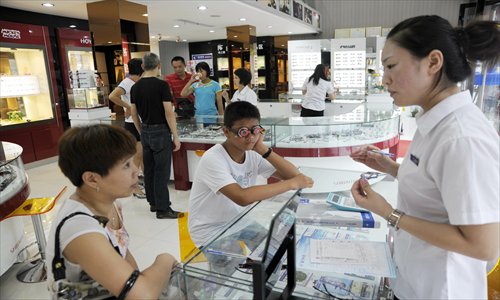City's plan to include eyesight in high school entrance assessment sparks controversy
By Xu Keyue Source: Global Times Published: 2020/7/23 2:18:11

Customers look at eyeglasses in a shop in Dongyang, East China's Zhejiang Province. File Photo: IC
A city in North China is in hot water after the public learned that students' eyesight will account for almost 10 percent of their score on senior high school entrance exams beginning in 2022, with parents arguing that the policy is unfair to students with poor eyesight, which many believe can be caused by studying too much and in improper lighting.
The policy discriminates against students who have poor eyesight and lower income families who can't afford possible corrective surgery, many parents wrote on Sina Weibo.
Some netizens were supportive of the policy saying it shows education authorities attach more importance to the quality of both body and knowledge, which can encourage students, families and schools to pay more attention to protecting eyes and promoting physical quality.
The policy, part of an education reform plan, was published by the government of Changzhi, North China's Shanxi Province on its website in 2019 but only recently seems to have caught attention on Chinese social media.
In the senior high school entrance exams, physical qualities will increase from 50 to 70 points, including 20 points for physical quality for which eyesight and body weight will be the main index, according to local authorities. The exam has a total possible score of 730.
Chinese students are under great academic pressure and have to study almost the whole day, which causes their myopia. "After the policy takes effect, students will lose scores on the entrance examination exactly because of hard-studying?" a net user posted.
A Shanghai-based ophthalmologist surnamed Wu said the policy disrespects science and isn't practical.
"Nearsightedness" can be caused by other pathological factors and outdoor activities will not help with that, Wu told the Global Times.
Even though these situations are ruled out, which is difficult in practice, the policy ignores the fact that myopia is affected by genetic factors, Wu noted. Children with a myopic parent are three times more likely to develop myopia than children whose parents don't have the disease.
The policy will also encourage eye surgery, which is not suitable for teenagers, as their eyes are still developing. It is not easy for incoming high school students, who are usually 15 years old, to get such surgeries, Wu said.
This type of eye surgery coast les then 10,000 yuan ($1,430) which not all families can afford.
Zhu Wei, a professor from the China University of Political Science and Law in Beijing, told the Global Times that the proportion for marks for eyesight to the total score is reasonable, and schools should not only enrich students' knowledge but also encourage them to build a healthy body.
Zhu said that for students with congenital myopia, who are in the minority, the policy can deal with the exceptional cases.
The policy is a timely response to the high rate of myopia among adolescents nationwide, he noted.
In 2018, the overall myopia rate among children and adolescents was 53.6 percent, said China's National Health Commission in April,2019.
Posted in: SOCIETY